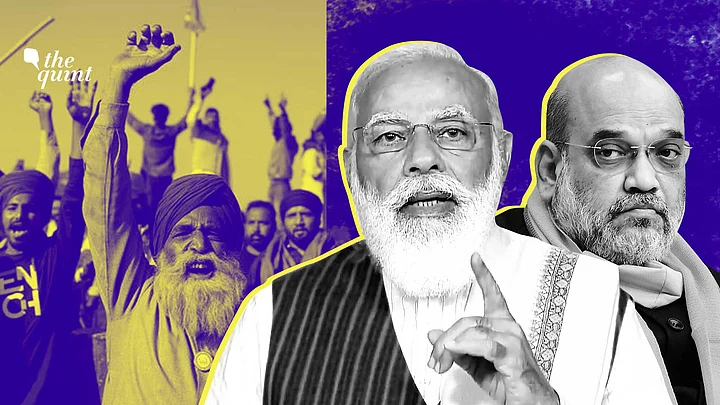The first round of negotiations between the Union government and farmers' representatives remained inconclusive on Tuesday. The meeting lasted over three hours but the farmers' representatives rejected the Centre's offer that a committee be set up to look into the three legislations that have sparked the protests.
The farmers maintained that this discussion should have taken place before passing the Bills.
The government was represented by Union Agriculture Minister Narendra Singh Tomar, Minister for Commerce, Industry, Food and Railways Piyush Goyal and Union MoS for Commerce and Industry Som Parkash, who also hails from Punjab.
The next round of talks is expected to take place on 3 December.
Curiously, Union Defence Minister Rajnath Singh, who was earlier reported to be leading the government delegation, was absent from the meeting.
Perhaps the involvement of Rajnath Singh as well as Union Home Minister Amit Shah may have been kept for a later date just in case the talks break down and the standoff intensifies.
Meanwhile protesting farmers are reported to have blocked the Delhi-Uttar Pradesh border at one location. The Delhi Haryana border had already been blocked at several places.
However the meeting itself was a significant climbdown for the government for two reasons.
A month ago, the government made farmers' leaders negotiate with a bureaucrat.
This is a climbdown even from the government's position earlier this week, that it would hold talks only if farmers protest at the desginated venue: Nirankari Samagam ground in Burari.
These climbdowns by the government stem from the fact that they have underestimated the farmers, particularly those from Punjab, at every step.
There are five wrong assumptions that the government may have made.
1. Protesters Can Be Bulldozed
When the protesting farmers in Punjab had blocked railway lines, the government responded by stopping trains from plying to Punjab, harming the supply of essential supplies. The shortage of coal, in turn, led to power shortages in Punjab.
The government didn't lift the blockade even when the protesters had moved from most of the railway lines. In the end the Punjab government had to mediate and get even the last group of protesting farmers to stop the one place that remained blocked.
The government saw this as a sign that it may be able to bulldoze the protests, but that didn't happen.
In fact, it made the farmers realise that a better way of strategy would be to take the protest to Delhi and prevent the government from taking punitive measures on Punjab.
2. Farmers Can Be Prevented From Reaching Delhi
It appears that the government grossly underestimated both the resolve as well as the numerical strength of the farmers. It was under the impression that by placing blockades in the Punjab-Haryana border and also on the different routes to Delhi, the farmers could be prevented from reaching the capital.
But that didn't happen. The farm unions like the different factions of Bharatiya Kisan Unions are extremely experienced in such marches and have well established networks in Haryana.
3. It's Only a Punjab Issue
The Punjab farmers got a lot of support from Haryana. From providing JCBs to breach blockades to support in terms of food, logistics and even numbers, Haryana farmers actively backed their counterparts from Punjab.
Farmers from Uttar Pradesh and Uttarakhand have also joined the protests from the East as have farmers of Mewat from the South.
This has contributed to the encirclement of Delhi by protesting farmers.
Farmers' groups from Maharashtra have also announced that if the demands are not met, they would also begin marching towards Delhi.
Far from being isolated, the farmers’ protests received support from even within the NDA, with RLP leader Hanuman Beniwal threatening to pull out if their demands aren’t met and JJP’s Ajay Chautala saying that the MSP clause should be made part of the farm laws.
In fact, the farmers even got international support with Canadian Prime Minister Justin Trudeau, defence minister Harjit Sajjan and several MPs speaking out in their support. The farmers' also found support from MPs in United Kingdom and Australia.
International scrutiny will make it difficult for the government to pursue openly hostile methods against farmers.
4. Farmers Will Agree to Protest at Burari
After the farmer faced water cannons and police lathis in Haryana, the Centre thought that a softer approach on reaching Delhi would make the farmers amenable to protesting at the Burari grounds, where few would notice the protests.
But the farmers' groups said that the grounds would be like an "open jail" and would make their protests meaningless. Instead they began protesting at several points of entry into Delhi, carrying out an encirclement of the city's borders.
This would give them far greater barganing power than a protest at Burari.
5. Khalistan Bogey Will Work
Haryana CM Manohar Lal Khattar claimed that "Khalistani elements" had infiltrated the protests, a line that was also pursued by BJP supporters on social media as well as a few news channels.
The aim was to delegitimise the protests, isolate the farmers from Punjab and perhaps even provide the pretext for the use of force.
But that didn't happen and the farmers' protest continued to get support.
The battle of wits between the Centre and the farmers is likely to continue for a few more days and the government may have to do something it is not in the habit of doing: compromising.
(At The Quint, we question everything. Play an active role in shaping our journalism by becoming a member today.)
